This deal is mentioned on Nissan's website(nissan.co.nz) but without any details. I've made the deal link a Trade Me search that finds at least some of these, although your local Nissan dealer may have more stock. Here's a Christchurch Nissan(christchurchnissan.co.nz) link with a couple more that aren't on Trade Me for example.
There are currently about 14 39kWh 2023 new or ex-demo vehicles listed for $29,990 on Trade Me, and about 8 59kWh vehicles (with more powerful motor) for $36,990. The new RRP for the 2024 Leaf is $63,990 + ORC for 39kWh or $72,990 + ORC for 59kWh.
The Leaf battery technology is getting on a bit but they are still extremely reliable and (mostly) well-made cars, and a great buy at this price if you want a brand new one. This could also depress the price of used Leafs even further, and they really are bargains at the moment.



Ah, so these dealers bought before the ev cash-back and now have excess stock… "ex-demo" lol.